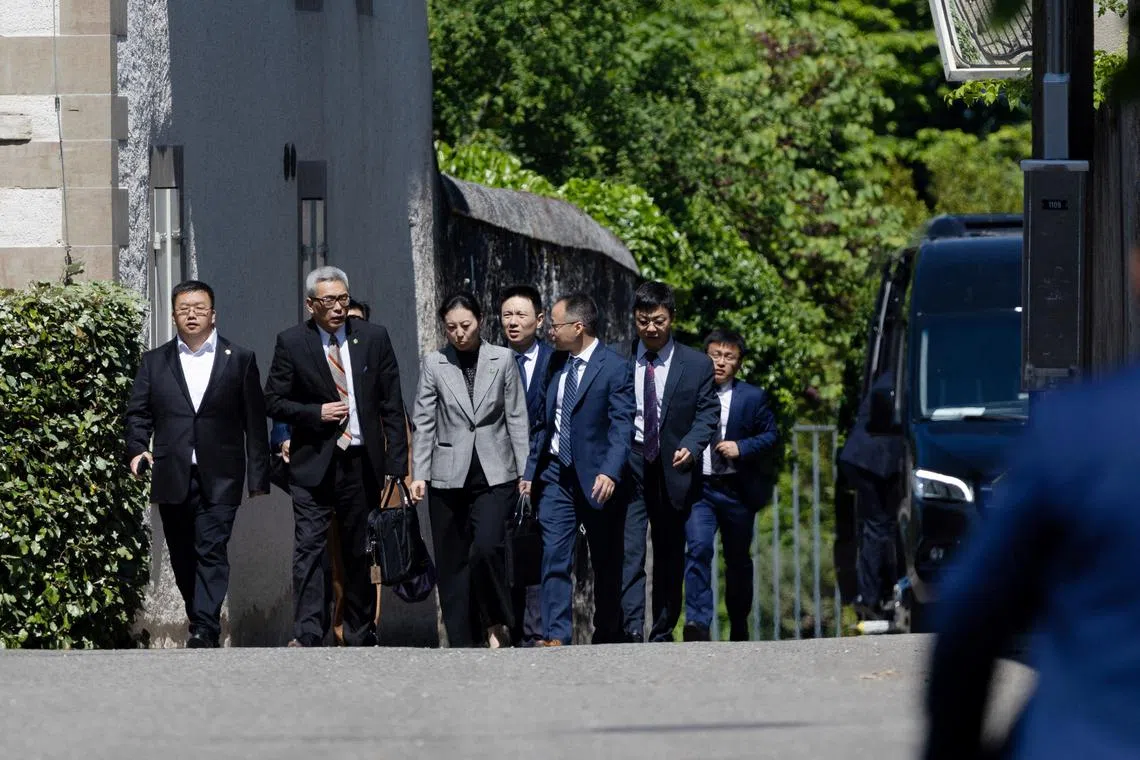US-China talks resume as Trump hails ‘total reset’ in trade relations
Sign up now: Get insights on Asia's fast-moving developments

Talks between the US and China are taking place at the residence of the Swiss ambassador to the UN.
PHOTO: AFP
GENEVA – Talks between top US and Chinese officials resumed for a second day on May 11 after US President Donald Trump voiced optimism over negotiations aimed at de-escalating trade tensions sparked by his aggressive tariff roll-out.
In a Truth Social post following a first day of talks in Geneva on May 10, Mr Trump praised the “very good” discussions and deemed them “ a total reset
Earlier, Chinese state news agency Xinhua also described the talks in Switzerland as “an important step in promoting the resolution of the issue”.
The second day of closed-door meetings between US Treasury Secretary Scott Bessent, Trade Representative Jamieson Greer and Chinese Vice-Premier He Lifeng resumed shortly after 10am (4pm Singapore time) on May 11.
As on May 10, the talks took place at the residence of the Swiss ambassador to the United Nations in Geneva, a discrete villa with sky-blue shutters near a large park on the left bank of Lake Geneva.
“These talks reflect that the current state of the trade relations with these extremely high tariffs is ultimately in the interests of neither the United States nor China,” Citigroup global chief economist Nathan Sheets said, calling the tariffs a “lose-lose proposition”.
‘Good news’
The discussions are the first time that senior officials from the world’s two largest economies have met face to face to tackle the thorny topic of trade since Mr Trump slapped steep new levies
The tariffs imposed by Mr Trump on the Asian manufacturing giant since the start of 2025 currently total 145 per cent
In retaliation, China put 125 per cent tariffs
Ahead of the meeting, Mr Trump signalled that he might lower the tariffs, suggesting on social media that an “80 per cent tariff on China seems right
However, his press secretary Karoline Leavitt later clarified that the US would not lower tariffs unilaterally, and that China would also need to make concessions.
Going into the meeting, both sides played down expectations of a major change in trade relations, with Mr Bessent underlining a focus on “de-escalation” and not a “big trade deal”, and Beijing insisting the US must ease tariffs first.
The fact the talks are even happening “is good news for business, and for the financial markets”, said Dr Gary Hufbauer, a senior non-resident fellow at the Peterson Institute for International Economics.
But Dr Hufbauer cautioned that he was “very sceptical that there will be any return to something like normal US-China trade relations”, with even a tariff rate of 70 per cent to 80 per cent still potentially halving bilateral trade.
China ‘better equipped’
China’s Vice-Premier went into the discussions buoyed by news on May 9 that China’s exports rose in April despite the trade war.
The unexpected development was attributed by experts to a rerouting of trade to South-east Asia to mitigate US tariffs.
Among some of the more moderate Trump officials like Mr Bessent and Commerce Secretary Howard Lutnick, “there is a realisation that China is better equipped to deal with this trade war than the US”, said Dr Hufbauer.
The Geneva meeting comes after Mr Trump unveiled a trade agreement with Britain
The five-page, non-binding deal confirmed to nervous investors that the US is willing to negotiate sector-specific relief from recent duties, but maintained a 10 per cent baseline levy on most British goods.
Following the US-Britain trade announcement, analysts have voiced pessimism about the likelihood negotiations will lead to any significant changes in the US-China trade relationship.
“It is nice that they are talking. But my expectations for the actual outcomes of this first round of talks is pretty limited,” said Citigroup’s Mr Sheets.
Dr Hufbauer said: “I think it is quite possible they will walk away from Geneva saying how constructive and productive the talks were, but not actually reducing tariffs at all.”
In his Truth Social post, Mr Trump said the talks have made “great progress”.
“We want to see, for the good of both China and the US, an opening up of China to American business,” he added. AFP


